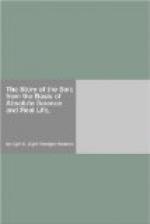The phosphate has also been put on some of the other forties. I convinced him that the money will pay a higher rate of interest in phosphate than it would in the savings bank, even if he put it on before manure and clover could be plowed under. The experiments of several states show this very conclusively.
The corn is on No. 3 this year and it is the best crop in the six years. Percy says the “Terry Act” (which means lots of work in preparing the land) is some help, but he thinks the phosphate shows against the check strips. The young wheat on No. 2 is looking fine, and with both limestone and phosphate on that field and the extra work on the seed bed, we hope for a better crop than we have ever grown on a full forty; even though we must depend solely upon our reserve stock of nitrogen for the crop. We are all about as jealous of that reserve stock of organic matter and nitrogen as we are of the Winterbine bank account.
I cannot forget how Percy tried to persuade me to postpone our wedding for a year because, as he said, the hogs had taken his corn crop and given nothing in return for it; and above all how he objected to my reimbursing the Winterbine reserve from my teacher’s wages to the extent of $250, which he had drawn in part to tide over the hard times, and in part to come to see me that Easter. But I am glad to have him still insist upon it that that uncertain venture proved his best investment, even if he does tease by adding that it paid one hundred and fifty per cent. net profit at Winterbine.
We are selling some cows this fall,—trying to weed out our herd by the Babcock test which shows that “some cows don’t pay their board and keep,” to quote Governor Hoard’s lecture on “Cows versus Cows,” which Percy heard at Olney the winter Professor Barstow was married. The “versus cows” are worth only $45.
I cannot tell you how I have enjoyed the summer. Sir Charles Henry is the dearest child, and his grandmother insists upon it that it is better for me to help Percy in the field with such light work as I can do, and I am out for a few hours every day when the weather is good. Percy’s mother is such a dear. I am sure she could be no more sweet and loving to an own daughter. She had Percy all to herself for so long that I was really afraid she might not like to share him with me, but Percy says that it was his mother who persuaded him to make us that Easter visit. We tell her that she hasn’t much use for either of us now, and that we are likely to get jealous because Charles Henry gets so much of her affection.
I forgot to tell you of Percy’s four-acre patch of wheat. He said it is so long to wait till 1912 for his first wheat crop on land that had grown clover at least once during historic times that he thought he would fix up a little patch to grow a crop of wheat, just to see how real wheat would look; or, as he sometimes says, to see how wheat grows in “Egypt” when it has a ghost of a chance.




